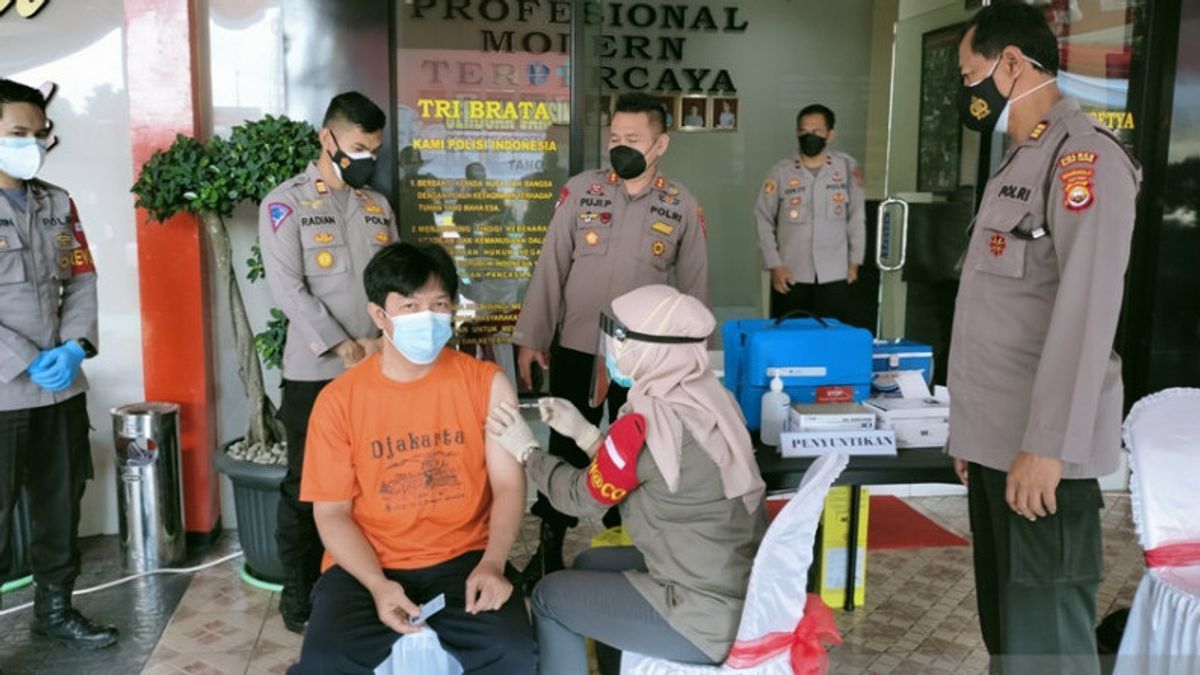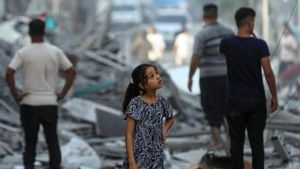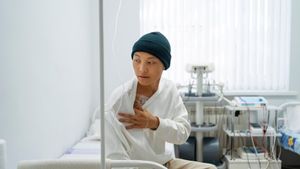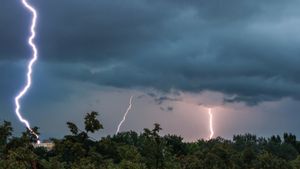JAKARTA - A number of people in several regions have complained about the lack of stock of COVID-19 vaccines. The chaotic distribution of vaccines is one of the causes. Worse yet, the process of exploring this vaccine is also suspected to have been hampered by political affairs.
In Bekasi, for example, yesterday the spokesperson for the Bekasi COVID-19 Task Force, Dr. Alamsyah, revealed that the vaccine stock in his area was empty. "Empty from Friday," he told Kompas.
Alamsyah revealed that his party had submitted a request for vaccine stock to the West Java Provincial Government. But certainty has not yet arrived.
Alamsyah hopes that he will immediately receive stock of the COVID-19 vaccine, both from the central government and the West Java Provincial Government. This is because the Bekasi Regency Government usually vaccinates up to 40,000 people per day.
In addition to Bekasi, recently a vaccine stock vacancy also occurred in Cianjur, West Java. Spokesman for the Task Force for Handling and Acceleration of COVID-19 in Cianjur Regency, Yusman Faisal, said that the stock of COVID-19 vaccine had been empty for two weeks.
While on Twitter social media, buzzer @kurawa complained that it had been almost two weeks since the COVID-19 vaccine had been empty in Jabodetabek. "Poor sir, those who want the 1st and 2nd vaccines are already restless... Later if they are ignorant, it will be dangerous," he wrote.
Vaccination inequalityMr. @jokowi it's been almost 2 weeks The covid19 vaccine is empty everywhere even in Jabodetabek, Asking for help, Mr. Jokowi to supervise again like when he checked on Covid19 medicines to the Ministry of Health and the State Minister for State-Owned Enterprises. Poor sir, those who want the 1st and 2nd vaccines are already restless.. later if they don't care it's dangerous
— Rudi Valinka (@kurawa) August 19, 2021
Previously, the government intensified the vaccination program to achieve the target of at least 70 percent of the total population in order to create herd immunity. However, the implementation is still minimal. According to Our World in Data, as of August 17, only 10.9 percent of the population was fully vaccinated.
Meanwhile, the uneven vaccination coverage between provinces is also a problem. According to data from the Ministry of Health as of August 18, only Jakarta, which has more than 50 percent received two doses of vaccination, namely 54.34 percent.
While the second largest is Bali, which reaches 43.38 percent of the population who has been vaccinated twice. Unfortunately, in some other provinces, vaccination coverage is still very low.
Lampung, for example, only 7.21 percent of its citizens have received the COVID-19 vaccination. Similarly, West Nusa Tenggara whose vaccination has only covered 7.82 percent of the population.
Because of this problem, the Governor of Lampung, Arinal Djunaidi, has even written to a number of ministers to speed up the implementation of the COVID-19 vaccination. "And finally, the Governor wrote a letter to Coordinating Minister for Maritime Affairs Luhut Binsar Panjaitan, which was also copied to the Minister of Health and the Minister of SOEs to request an acceleration of vaccine drop-off," said Head of the Lampung Provincial Health Office, Reihana in an official statement quoted by RRI.
Reihana said the effort was made so that the ranks of the Provincial or Regency/City Health Offices could fulfill the vaccine target for 6 million residents. "To accelerate the Covid-19 vaccination program, we have made maximum efforts, by immediately distributing each shipment of vaccines to 15 districts/cities."

Another problem related to Indonesia's weak COVID-19 vaccination is that the estimated distribution of the corona vaccinator is still uneven. The number of health workers is indeed a significant factor for the success of this pandemic prevention program.
Based on data from the Ministry of Health quoted by Katadata, there are 1.5 million health workers in Indonesia in 2020. However, almost 50 percent or 48.8 percent of them are concentrated on the island of Java.
The rest are scattered in various other regions in Indonesia. For example, in Sumatra 24.2 percent, 6.6 percent in Bali and Nusa Tenggara, 7.5 percent in Kalimantan, 9.6 percent in Sulawesi, and 3.3 percent in Maluku and Papua.
Another factor that hinders vaccination in the regions is that not all health centers throughout Indonesia have supporting logistics. According to the CISDI survey, 3.8 percent of puskesmas do not have refrigerators for working vaccines. All of these health centers were recorded as coming from outside Java.
Indeed, 99 percent of puskesmas stated that they already had a vaccine carrier. However, there are still 8.7 percent of puskesmas that do not have sufficient ice packs for all vaccine carriers. Even though ice packs are needed to maintain the temperature inside the vaccine carrier, it can stay up to standard.

Apart from technical issues, the complicated distribution of the COVID-19 vaccine is also constrained by political views. Deputy for Humanitarian Affairs at the Presidential Staff Office (KSP), Abetnego Panca, said that there was a provincial government that deliberately did not distribute the COVID-19 vaccine due to different political views from the central government.
"I want to be honest, many provinces have not distributed vaccines that have been divided into regencies because of differences in political views (with the central government)," Abetnego said August 18, quoted by CNNIndonesia.
Abetnego said that President Jokowi did not know about this issue. That is one of the reasons why this distribution task is assigned to the TNI and Polri. "In the TNI there are no (political differences), in the Police as well."
Abetnego's explanation came out in response to the findings of LaporCovid-19 volunteers who thought that giving vaccination authority to the TNI and Polri would cause problems. Especially about the even distribution of vaccines to the regions.
LaporCovid-19 volunteer Firdaus Ferdiansyah said there were many reports from Puskesmas that had run out of vaccine stock. "But it turns out that the vaccinations are held at centers owned by the TNI-Polri," said Firdaus.
*Read other information about Vaccines or other interesting articles from Ramdan Febrian Arifin.
Other BERNAS
The English, Chinese, Japanese, Arabic, and French versions are automatically generated by the AI. So there may still be inaccuracies in translating, please always see Indonesian as our main language. (system supported by DigitalSiber.id)










